- Home
- Julia London
Tempting the Laird
Tempting the Laird Read online
Mystery and desire cloak the Scottish Highlands
Unruly. Unmarried. Unapologetic. Catriona Mackenzie’s reputation precedes her everywhere she goes. Her beloved late aunt Zelda taught Cat to live out loud and speak her mind, and that’s exactly what she does when Zelda’s legacy—a refuge for women in need—comes under fire. When her quest puts her in the path of the disturbingly mysterious Hamlin Graham, Duke of Montrose, Cat is soon caught up in the provocative rumors surrounding the dark duke. Never one to retreat, Cat boldly goes where no one else has dared for answers.
Shrouded in secrets, a hostage of lies, Hamlin must endure the fear and suspicion of those who believe he is a murderer. The sudden disappearance of his wife and the truth he keeps silent are a risk to his chances at earning a coveted parliamentary seat. But he’s kept his affairs tightly held until a woman with sparkling eyes and brazen determination appears unexpectedly in his life. Deadly allegations might be his downfall, but his unleashed passion could be the duke’s ultimate undoing.
Praise for New York Times bestselling author Julia London
“Warm, witty and decidedly wicked—great entertainment.”
—#1 New York Times bestselling author Stephanie Laurens on Hard-Hearted Highlander
“Julia London writes vibrant, emotional stories and sexy, richly drawn characters.”
—New York Times bestselling author Madeline Hunter
“An absorbing read from a novelist at the top of her game.”
—Kirkus Reviews, starred review, on Wild Wicked Scot
“Expert storytelling and believable characters make the romance [one that] readers will be sad to leave behind.”
—Publishers Weekly, starred review, on Wild Wicked Scot
“London is at the top of her game in this thrilling tale of political intrigue and second chances.”
—Booklist, starred review, on Wild Wicked Scot
“The fascinating love triangle, set amid the wilds of Scotland, creates a page-turning read that will resonate with fans of Highland romance.”
—Publishers Weekly on Hard-Hearted Highlander
Also available from Julia London
and HQN Books
The Cabot Sisters
The Trouble with Honor
The Devil Takes a Bride
The Scoundrel and the Debutante
The Highland Grooms
Wild Wicked Scot
Sinful Scottish Laird
Hard-Hearted Highlander
Devil in Tartan
JULIA LONDON
Tempting the Laird
Contents
CHAPTER ONE
CHAPTER TWO
CHAPTER THREE
CHAPTER FOUR
CHAPTER FIVE
CHAPTER SIX
CHAPTER SEVEN
CHAPTER EIGHT
CHAPTER NINE
CHAPTER TEN
CHAPTER ELEVEN
CHAPTER TWELVE
CHAPTER THIRTEEN
CHAPTER FOURTEEN
CHAPTER FIFTEEN
CHAPTER SIXTEEN
CHAPTER SEVENTEEN
CHAPTER EIGHTEEN
CHAPTER NINETEEN
CHAPTER TWENTY
CHAPTER TWENTY-ONE
CHAPTER TWENTY-TWO
CHAPTER TWENTY-THREE
CHAPTER TWENTY-FOUR
CHAPTER TWENTY-FIVE
CHAPTER TWENTY-SIX
CHAPTER TWENTY-SEVEN
EPILOGUE
AUTHOR’S NOTE
GLOSSARY
CHAPTER ONE
Kishorn Lodge, Scottish Highlands, 1755
THERE’D BEEN A spirited debate among the Mackenzies of Balhaire over where to bury the remains of the venerable Griselda Mackenzie. Arran Mackenzie, her much beloved cousin, wanted her buried at the clan’s seat at Balhaire alongside two hundred years of Mackenzies. But Catriona, his youngest daughter—who had been as close to her “Auntie” Zelda as her own mother—wanted to bury her at Kishorn Lodge, where Griselda had lived most of her remarkable life.
In the end, a compromise was struck. Auntie Zelda was buried in the family crypt at Balhaire, but a fèille in her honor was held at Kishorn a month later. This arrangement satisfied Catriona, as it was the celebration she wanted for a woman who had lived life very much on her own terms.
Unfortunately, the weather turned foul on the eve of her fèille. Kishorn was remote, far into the Highlands, reachable practically only by boat. Therefore, only the most immediate Mackenzie family was able to attend, rowing up from Balhaire, past the Mackenzie properties of Arrandale and Auchenard, and across Loch Kishorn to the point where the loch met the river for which it was named.
There was scarcely anything or anyone this far into the Highlands. A village and prime hunting grounds had once graced the banks of the river, but they were long gone. A Mackenzie ancestor had built the lodge on the ruins of the village. Zelda, who had always preferred her freedom to a confining marriage, and had been indulged by her father, had taken possession of the abandoned lodge as a young woman and had made it her home, lovingly repairing and adding to it over the years.
The only thing left of that ancient village was a crumbling abbey, built on a hilltop overlooking the river glen. It was small as abbeys went, and no one could say whose abbey it had been. Zelda had decided it was hers and had made half of the original structure habitable again. The other half—what had once been the sanctuary—was missing its walls, and only a few beams and arches remained of the roof. It served no useful purpose, other than to provide a wee bit of respite from the weather for the cows that wandered in from time to time.
If only they’d had a respite from the cold rain that continued to beat a steady rhythm against the paned windows on the day of the fèille.
Catriona was quite undone by it—she’d planned this event to rival all such celebrations for years to come. “I’m bloody well cross with God this day, that I am,” she said to the women gathered around the fire blazing in the hearth. They included her mother, the Lady of Balhaire, and Catriona’s sister, Vivienne. Also present were her sisters-in-law, Daisy, Bernadette and Lottie. “It rained the day we buried her, and here it rains again. She deserved better, she did,” Catriona said as she carelessly held up her wineglass to be refilled.
“Zelda would not care a whit about rain, Cat,” her mother assured her. “She would care only that you carried on with the fèille in spite of it. Can’t you hear her laughing? She’d say, ‘Did you expect cherubs and bluebirds to herald my arrival? No, lass, heaven weeps when I knock at the door.’”
“Mamma,” Catriona said gravely, but she couldn’t help a small smile. Zelda would have indeed said something like that.
“I miss that old crone,” her mother said fondly, and lifted her glass in solemn salute. “She was incomparable.”
That was high praise coming from Margot Mackenzie. She and Zelda had maintained a fraught relationship through the years, had never quite seen eye to eye for reasons Catriona still didn’t fully understand. She knew that Zelda couldn’t bring herself to forgive her mother for being English, which, to be fair, was a sin in the eyes of many Highlanders. But Zelda had also seemed determined to believe the absurd notion that Catriona’s mother was a spy, of all things. Once, Catriona had asked her father why Auntie Zelda said her mother was a spy, and he’d given her a strange look. “Some things are better left in the past, aye?” he’d said. “You canna believe everything Zelda says, lass.”
He had not, Catriona had noted, denied it.
In spite of
the ancient discord between the two women, in the last months of Zelda’s life, when she’d been ill more often than she’d felt well, Catriona’s mother had come once a week from Balhaire to sit with her. The two of them would argue about events that had occurred during their long lives, but they’d laughed, too, giggling with one another about secret things.
One of the serving women refilled Catriona’s wineglass. She drank it like water.
With all the Mackenzies crowded into the lodge, there was little room for the games Catriona had planned, and little else to occupy them. Frankly, Catriona had fallen into her cups. No, that wasn’t correct—she was swimming in her cups, an idea that made her giggle.
“There ought to be dancing,” Lottie complained, and shifted uncomfortably under the weight of the bairn she was holding. Another boy. “Something.”
“What do you mean?” Vivienne said. “You canna dance, Lottie.” She nodded to the bairn. Lottie had only recently delivered Carbrey. The birth of a second son had Catriona’s brother Aulay strutting about Balhaire like a bloody peacock.
“Aye, but you can dance,” Lottie said, nudging Vivienne. “And I should like to watch.”
“Me? I’m too old and too fat for it, that I am,” Vivienne complained, and slumped back in her chair, one hand across her belly. Bearing four children had left her with a full figure. “Bernadette will dance.”
“By myself?” Bernadette, wife of Catriona’s brother Rabbie, bent down to stir the logs in the hearth. “Shall I hum the music, as well?”
“And what of me?” Daisy asked. She was wed to Cailean, Catriona’s oldest brother. “I’m not too old for a reel.”
“Or too fat,” Lottie agreed.
“No, but your husband is too old,” Vivienne said, and nodded toward Cailean. He was seated near a brazier with their father, his legs stretched long. A tankard of ale dangled from two fingers.
“’Tis a pity that Ivor MacDonald is no’ here to dance with our Cat,” Catriona’s mother said, and smiled devilishly at her daughter.
Catriona’s inhibitions had been drowned by the good amount of wine she’d drunk, and she groaned with frustration. “You’ll no’ rest from seeing me properly wed until you meet your demise!”
“And what is wrong with that, I ask you?” her mother asked sweetly.
“Yes, what is wrong with that?” Daisy asked. “Why will you not accept Mr. MacDonald’s attentions, Cat?” she asked curiously. “He seems rather nice. And God knows, he is smitten with you.”
Ivor was a thick man, the same height as Catriona, with hair that drooped around his face. In the weeks since Zelda had died, he’d offered his condolences so many times she’d lost count. “He may smite all he likes, but I’m far too restless to tie my lot to a shipbuilder,” Catriona said imperiously, and drained the rest of the wine from her glass. Actually, his occupation had little to do with it—it was most decidedly his lack of a neck.
“I think that’s incorrect,” Lottie said, looking puzzled as Catriona held her glass up again. “He hasn’t smited you, but rather, you’re the one who’s done the smiting, are you no’?”
Catriona clucked at her. “You know verra well what I mean, aye?”
“Aye, I know verra well,” Lottie agreed. “But you’re three and thirty, Cat. Sooner or later you must accept that the last sheep at market must take the price offered or be turned to mutton.”
“Lottie!” Bernadette gasped. “What a wretched thing to say!”
Catriona gave the remark a dismissive flick of her wrist. “Aye, but it’s the truth, is it no’? I am firmly planted on the bloody shelf of spinsterhood. I’ve quite accepted I’m to remain without husband or child all my life, aye? That’s what Zelda did, and quite by choice. I know what I’m meant to do—I’m meant to carry on Auntie Zelda’s work.”
“I should like to think you are destined for something other than living at Kishorn, removed from all society,” her mother said. “You are not Zelda, after all.”
Well, that was just the thing—there was no society for her. There was nothing for her here but endless days stretching into more endless days, with nothing to occupy her but this blasted abbey in the middle of nowhere. “What society, Mamma? Do you mean the Mackenzies and all their married men? Or perhaps you mean the MacDonalds and their representative, Ivor?”
“If you don’t care for Mr. MacDonald, there is more society for you to explore,” her mother argued. “But spending all your time at Kishorn has isolated you from the world.”
“Mmm,” Catriona said skeptically. “I think I may safely say I have explored all available society in the Highlands, and like my dearly departed auntie, I’ve found it wanting, I have. And besides, the women and children of the abbey need me, Mamma. Why should I no’ have a grand purpose?” she asked, and gestured so grandly that she spilled wine onto the stone floor. “I’ve learned all that I could from Zelda. The women of the abbey have no other place to go, and I’m determined to carry on, that I am, for there is still so much to be done, and Zelda would have wanted it so. Donna try and dissuade me, Mamma.” She sat up and turned around. “Where is that serving girl?”
“Catriona, darling,” her mother pleaded.
But Catriona was in no mood to discuss her future plans. “Diah save me,” she said, and stood up, swaying when she did, and catching herself on the back of the chair before she tumbled. She was exhausted from discussing her situation. She felt as if she’d been discussing it for years and years. Poor Catriona Mackenzie, whatever will they do with her? She’s no prospects for marriage, no society, nothing to occupy her but a run-down abbey full of misfits. “I think I should like to dance, then. Is Malcolm Mackenzie about? He’s brought his pipes, I’m certain of it.”
“For the love of God, sit, Cat.” Bernadette caught Catriona’s hand and tried to tug her back into her seat. “You’re pissed—”
“I’ve scarcely had a drop!” Catriona insisted. “That’s the English in you, Bernie,” she said, and wagged a finger at her sister-in-law. “We Scots are far better dancers with a wee bit of wine in us, aye?”
“You could hurt someone,” Bernadette said, and tugged on her hand again.
“You really shouldna drink so,” Vivienne said disapprovingly.
“I shouldna drink, I shouldna dance,” Catriona said irritably. Her few drops of wine were enough to make her feel a wee bit stubborn, and she yanked her hand free of Bernadette’s. But in doing so, she misjudged her balance and stumbled backward into someone. She managed to right herself and turn about and laughed with delight when she saw who had caught her. Rhona MacFarlane was the abbess at Kishorn. Rhona wasn’t really an abbess—she had a heart of gold, but she was no nun. Nevertheless, everyone called her the abbess, as she had been working alongside Zelda for twelve years.
“Aye, look who has come to jig with me, then! Thank you, Rhona, dearest. You’ve saved me from a scolding, and I should verra much like to dance.” Catriona made a flourish with her hand and bowed low, very nearly tipping over.
“There’s no music,” Rhona said.
“A fair point,” Catriona conceded, and grabbed Rhona’s arms and teased her by trying to make her dance. “We donna need music!”
“Miss Catriona!” Rhona said, and pulled her arms free.
“Aye, all right, I’ll find Malcolm,” Catriona said petulantly.
“Miss Catriona, we have visitors,” Rhona said.
Catriona gasped with delight. “Visitors! Who has come?” She whirled around to the door, expecting to see the MacDonalds from Skye, all of whom had known Zelda well. But the men at the door were not MacDonalds—Catriona could tell by their demeanor they were no friends of the Mackenzies or Kishorn. She was suddenly reminded of the two letters Zelda had received in the last months of her life. Letters written on heavy vellum, with an official seal. Letters that Zelda had waved away as nonsense.
Fu
ry swelled in Catriona, her heart calling her to arms and swimming against the tide of wine she’d drunk. How dare they blacken the fèille for Griselda Mackenzie with their presence! If they thought the abbey was easy picking now that Zelda was gone, Catriona would show them that was not the case—she’d die before she’d let these men take the abbey from her and Zelda’s memory.
“What visitors?” her mother asked, rising to her feet.
“Bloody bastards, that’s who,” Catriona said, and began striding for the door before her mother could stop her. As she neared the men, the one in front bowed his head.
“Who are you?” Catriona demanded.
“Ah. You must be Miss Catriona Mackenzie,” the man responded in a crisp English accent. He removed his cocked hat, slinging water onto the floor and one of the Kishorn dogs, who shook it off his coat.
“How do you know my name? How did you get here?”
“It is my occupation to know your name, and a man at Balhaire was kind enough to bring us.” He removed his dripping cloak and handed it to the gentleman beside him. His coat and waistcoat were so damp and heavy that they smelled of wet wool and hung nearly to his knees. “I am Mr. Stephen Whitson, agent of the Crown. Would you do me the courtesy of informing the laird that I have come to present a matter of some urgency to him?”
“My laird?”
That man calmly returned her gaze. “As I said, it is a matter of urgency.”
“Is it the same matter of urgency that compelled you to badger my ailing aunt on her deathbed with your letters, then?”
“I beg your pardon, Miss Mackenzie, but this is a matter for men—”
“It’s a matter of bloody decency—” She was startled out of saying more by the firm clamp of a very big hand on her shoulder. Cailean had appeared at her side and squeezed her shoulder as he gave her a look that warned her to hold her tongue.
“I beg your pardon, what’s this about, then?” he asked calmly.
“Milord, Mr. Stephen Whitson at your service,” the man said, bending over his outstretched leg.

 A Royal Kiss & Tell
A Royal Kiss & Tell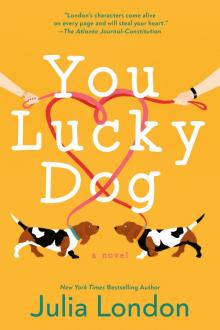 You Lucky Dog
You Lucky Dog The Devil in the Saddle
The Devil in the Saddle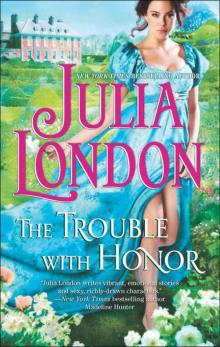 The Trouble with Honor
The Trouble with Honor Tempting the Laird
Tempting the Laird The Secret Lover
The Secret Lover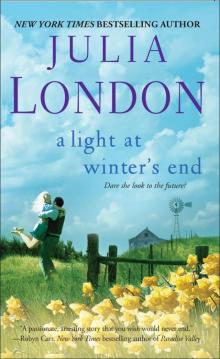 A Light at Winter’s End
A Light at Winter’s End The Charmer in Chaps
The Charmer in Chaps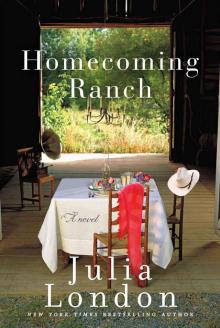 Homecoming Ranch
Homecoming Ranch Jack (7 Brides for 7 Soldiers Book 5)
Jack (7 Brides for 7 Soldiers Book 5)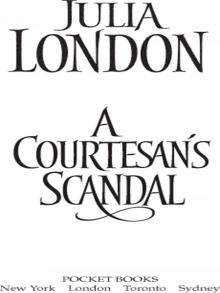 A Courtesan's Scandal
A Courtesan's Scandal Hard-Hearted Highlander--A Historical Romance Novel
Hard-Hearted Highlander--A Historical Romance Novel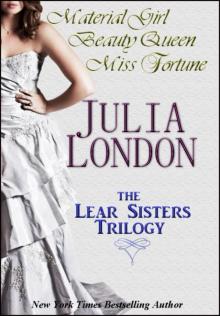 The Complete Novels of the Lear Sister Trilogy
The Complete Novels of the Lear Sister Trilogy The Last Debutante
The Last Debutante Suddenly Single (A Lake Haven Novel Book 4)
Suddenly Single (A Lake Haven Novel Book 4) Seduced by a Scot
Seduced by a Scot Highlander Unbound
Highlander Unbound Suddenly Dating (A Lake Haven Novel Book 2)
Suddenly Dating (A Lake Haven Novel Book 2) The Bridesmaid
The Bridesmaid The Seduction of Lady X
The Seduction of Lady X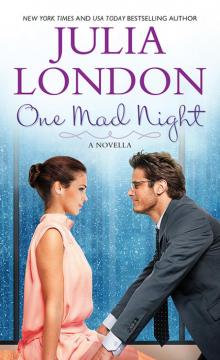 One Mad Night
One Mad Night Extreme Bachelor
Extreme Bachelor The Scoundrel and the Debutante
The Scoundrel and the Debutante The Revenge of Lord Eberlin
The Revenge of Lord Eberlin American Diva
American Diva The Lovers: A Ghost Story
The Lovers: A Ghost Story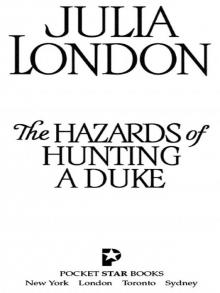 The Hazards of Hunting a Duke
The Hazards of Hunting a Duke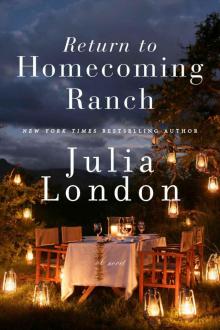 Return to Homecoming Ranch (Pine River)
Return to Homecoming Ranch (Pine River)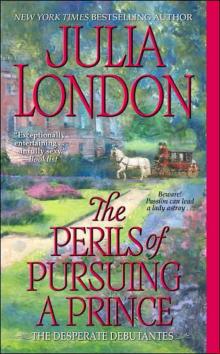 The Perils of Pursuing a Prince
The Perils of Pursuing a Prince Highlander in Love
Highlander in Love The Devil Takes a Bride
The Devil Takes a Bride Devil in Tartan
Devil in Tartan Wild Wicked Scot
Wild Wicked Scot Snowy Night with a Highlander
Snowy Night with a Highlander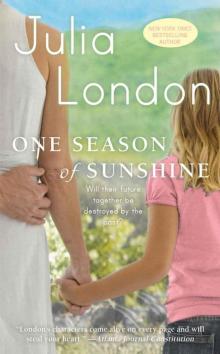 One Season of Sunshine
One Season of Sunshine Summer of Two Wishes
Summer of Two Wishes All I Need Is You aka Wedding Survivor
All I Need Is You aka Wedding Survivor Sinful Scottish Laird--A Historical Romance Novel
Sinful Scottish Laird--A Historical Romance Novel Suddenly Engaged (A Lake Haven Novel Book 3)
Suddenly Engaged (A Lake Haven Novel Book 3) Highlander in Disguise
Highlander in Disguise Suddenly in Love (Lake Haven#1)
Suddenly in Love (Lake Haven#1)